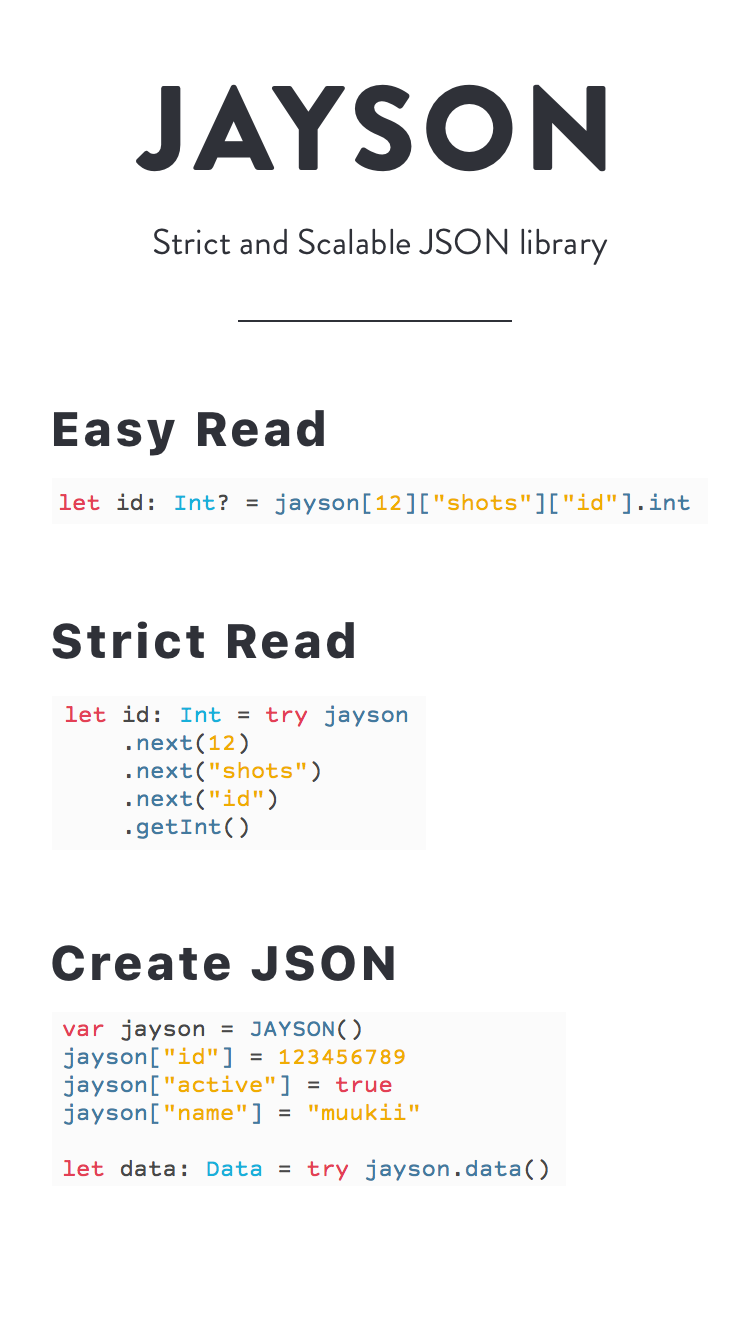Strict and Scalable JSON library.
Swift 3.0 iOS📱, watchOS⌚️, tvOS📺, macOS🖥, Linux✨
Easy Access (almost same with SwiftyJSON)
let urlString: String? = jayson[3]["shot"]["images"]["hidpi_image"].stringif the value does not exist, throw JSONError
Failed location can be known from JSONError
Get Value (String, Bool, Number)
let id: String = try jayson
.next(0)
.next("id")
.getString()Get Value with Decoder (Custom Object)
Using the Decoder can be transformed in a custom object.
And, throwable
let urlDecoder = Decoder<URL> { (jayson) throws -> URL in
URL(string: try jayson.getString())!
}
let imageURL: URL = try jayson
.next(0)
.next("image")
.next("hidpi_image")
.get(with: urlDecoder)General Getter
Strict getters
extension JSON {
public func getDictionary() throws -> [String : JSON]
public func getArray() throws -> [JSON]
public func getNumber() throws -> NSNumber
public func getInt() throws -> Int
public func getInt8() throws -> Int8
public func getInt16() throws -> Int16
public func getInt32() throws -> Int32
public func getInt64() throws -> Int64
public func getUInt() throws -> UInt
public func getUInt8() throws -> UInt8
public func getUInt16() throws -> UInt16
public func getUInt32() throws -> UInt32
public func getUInt64() throws -> UInt64
public func getString() throws -> String
public func getBool() throws -> Bool
public func getFloat() throws -> Float
public func getDouble() throws -> Double
}
///
extension JSON {
public func get<T>(_ s: (JSON) throws -> T) rethrows -> T
public func get<T>(with decoder: Decoder<T>) throws -> T
}Optional Read-only properties😁
extension JSON {
public var dictionary: [String : Any]? { get }
public var array: [Any]? { get }
public var string: String? { get }
public var number: NSNumber? { get }
public var double: Double? { get }
public var float: Float? { get }
public var int: Int? { get }
public var uInt: UInt? { get }
public var int8: Int8? { get }
public var uInt8: UInt8? { get }
public var int16: Int16? { get }
public var uInt16: UInt16? { get }
public var int32: Int32? { get }
public var uInt32: UInt32? { get }
public var int64: Int64? { get }
public var uInt64: UInt64? { get }
public var bool: Bool? { get }
}let jsonData: Data = ...
let jayson = try JSON(data: jsonData)let jsonData: Data
let json: Any = try JSONSerialization.jsonObject(with: data, options: [])
let jayson = try JSON(any: json)let userInfo: [AnyHashable: Any]
let jayson = try JSON(any: json)let objects: [Any]
let jayson = try JSON(any: json)In the case of the following try it is not required.
let object: [String : JSON]
let jayson = JSON(object)let object: [JSON]
let jayson = JSON(object)let object: [JSONWritableType]
let jayson = JSON(object)let object: [String : JSONWritableType]
let jayson = JSON(object)let path = try jayson
.next(0)
.next("image")
.next("hidpi_image")
.currentPath()
// path => "[0]["image"]["hidpi_image"]"If you have access that does not exist key, throw JSONError.
public enum JSONError: Error {
case notFoundKey(key: String, json: JSON)
case notFoundIndex(index: Int, json: JSON)
case failedToGetString(source: Any, json: JSON)
case failedToGetBool(source: Any, json: JSON)
case failedToGetNumber(source: Any, json: JSON)
case failedToGetArray(source: Any, json: JSON)
case failedToGetDictionary(source: Any, json: JSON)
case decodeError(source: Any, json: JSON, decodeError: Error)
case invalidJSONObject
}example:
do {
let urlString: String = try jayson
.next("shots")
.next(0)
.next("user")
.next("profile_image")
.next("foo") // ‼️ throw
.getString()
} catch {
print(error)
}Output JAYSONError
notFoundKey("foo",
JAYSON
Path: Root->["shots"][0]["user"]["profile_image"]
SourceType: dictionary
Source:
{
large = "https://...";
medium = "https://...";
small = "https://...";
})
try jayson
.next(0)
.next("image")
.back() // <---
.next("image")
.next("hidpi_image")let jayson = try! JSON(data)
struct Shot {
let id: Int
let title: String
let width: Int
let height: Int
let hidpiImageURLString: String?
let normalImageURLString: String
let teaserImageURLString: String
}
do {
let shots: [Shot] = try jayson.getArray().map { jayson -> Shot in
let imagesJayson = try jayson.next("images")
return Shot(
id: try jayson.next("id").getInt(),
title: try jayson.next("title").getString(),
width: try jayson.next("width").getInt(),
height: try jayson.next("height").getInt(),
hidpiImageURLString: try? imagesJayson.next("hidpi").getString(),
normalImageURLString: try imagesJayson.next("normal").getString(),
teaserImageURLString: try imagesJayson.next("teaser").getString()
)
}
print(shots)
} catch {
print(error)
}var jayson = JSON()
jayson["id"] = 18737649
jayson["active"] = true
jayson["name"] = "muukii"
var images = [String:JSON]()
images["large"] = "http://...foo"
images["medium"] = "http://...bar"
images["small"] = "http://...fuzz"
jayson["images"] = JSON(images)
let data = try jayson.data(options: .prettyPrinted)-> data
{
"name" : "muukii",
"active" : true,
"id" : 18737649,
"images" : {
"large" : "http:\/\/...foo",
"small" : "http:\/\/...fuzz",
"medium" : "http:\/\/...bar"
}
}
var jayson = JSON()
jayson["String"] = "String"
jayson["NSString"] = JSON("NSString" as NSString)
jayson["NSNumber"] = NSNumber(value: 0)
jayson["Int"] = 64
jayson["Int8"] = JSON(8 as Int8)
jayson["Int16"] = JSON(16 as Int16)
jayson["Int32"] = JSON(32 as Int32)
jayson["Int64"] = JSON(64 as Int64)
jayson["UInt"] = JSON(64 as UInt)
jayson["UInt8"] = JSON(8 as UInt8)
jayson["UInt16"] = JSON(16 as UInt16)
jayson["UInt32"] = JSON(32 as UInt32)
jayson["UInt64"] = JSON(64 as UInt64)
jayson["Bool_true"] = true
jayson["Bool_false"] = false
jayson["Float"] = JSON(1.0 / 3.0 as Float)
jayson["Double"] = JSON(1.0 / 3.0 as Double)
jayson["CGFloat"] = JSON(1.0 / 3.0 as CGFloat)JAYSON is available through CocoaPods. To install it, simply add the following line to your Podfile:
pod "JAYSON"muukii, m@muukii.me
JAYSON is available under the MIT license. See the LICENSE file for more info.






